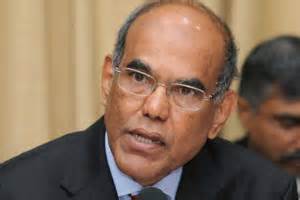MUMBAI (Reuters) – Reserve Bank of India’s outgoing Governor Duvvuri Subbarao on Thursday upheld the central bank’s defense of the rupee, saying it was necessary to stabilize markets until the government takes action to narrow the current account deficit.
Subbarao, in his last public speech as governor, also emphasized the central bank’s policy was not to resort to capital controls, addressing controversial RBI measures to restrict currency outflows from Indian citizens and companies.
The RBI has passed extraordinary measures since last month to defend a currency plunging to record lows, which have also included measures to drain cash and curb speculative trading.
In its latest action, the central bank late on Wednesday said it would provide dollars directly to state-run oil companies, after the rupee had hit its last record low of 68.85 during the trading session.
“The only lasting solution to our external sector problem is to reduce the CAD to its sustainable level,” Subbarao addressed industry and banks at a lecture.
Raghuram Rajan, a former chief economist of the International Monetary Fund, will take over as the RBI governor on September 5.
“Reducing the CAD requires structural solutions – RBI has very little policy space or instruments to deliver the needed structural solution. They fall within the ambit of the government,” he added.
Subbarao’s remarks come as the government has been widely criticized by analysts and investors for failing to provide solutions to the record high current account deficit – a key reason behind the rupee’s weakness.
The outgoing governor, whose hawkishness on monetary policy, has clashed with the growth-oriented leanings of New Delhi, added the RBI stepped to defend financial stability.
“Structural adjustment will also take time. In the interim, we need to stabilize the market volatility, a task that falls within the domain of the Reserve Bank.”
Subbaro also said the RBI policy has not been to resort to capital controls, which investors have feared since the central bank imposed restrictions on money outflows earlier this month.
“I must reiterate here that it is not the policy of the Reserve Bank to resort to capital controls or reverse the direction of capital account liberalization,” Subbarao said.
“Notably, the measures that we took did not restrict inflows or outflows by non-residents.”
However, Subbarao said the RBI’s overall action had been consistent, calling its measures India’s version of “operation twist,” or the term used to describe the Federal Reserve’s bond purchase programme.
“There has been criticism that the Reserve Bank’s policy measures have been confusing and betray a lack of resolve to curb exchange rate volatility. Let me first of all reiterate that our commitment to curbing volatility in the exchange rate is total and unequivocal,” he said.
Subbarao also argued in favour of the RBI’s wider mandate of price stability and interest rates, though noting that responsibility for financial stability needed to be shared with the government and other regulators.
“Admittedly, the Reserve Bank has a mandate that is wider than that of most central banks. This is an arrangement that has served the economy well,” he said.
Addressing RBI staff, Subbarao called on the central bank to maintain its autonomy.
“To the Reserve Bank staff, I want to say that they must be as zealous about rendering accountability as they are about guarding its autonomy.”
While the RBI is not independent, it operates with a high degree of autonomy.
(Reporting by Neha Dasgupta and Suvashree Dey Choudhury; Editing by Rafael Nam)
yh



